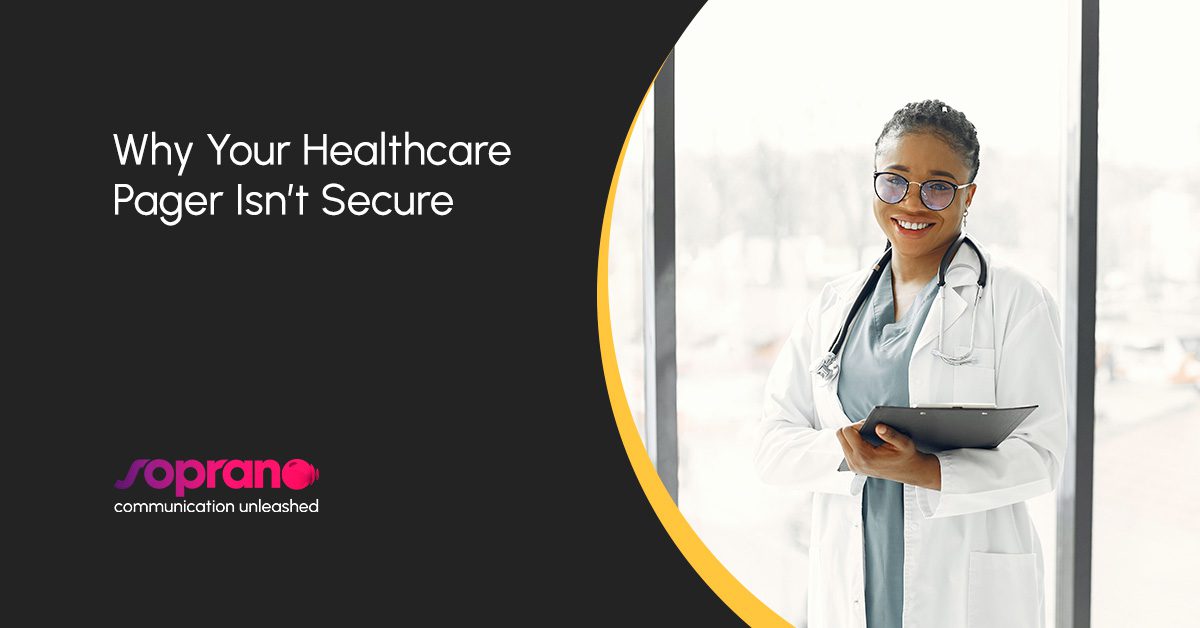
Healthcare Pagers, or beepers, have been a trusted ally to the healthcare industry for well over 60 years.
The technology was developed back in the 1940s and by the time the ‘80s and ‘90s came, they were firmly clipped to the belts of clinicians.
This small radio device is simple to use. It interrupts and alerts the user of an easy to read text message. In healthcare, this message is typically a request for a call back. However, back in the day this simplicity and limited capability made sense in the heavily regulated healthcare industry. With their long battery lives and network coverage, pagers were trusted by many doctors as their go to source of notifications and alerts.
But with the trend of hospitals leveraging mobile technology raises the question whether pagers are really as secure and effective as we used to think.
One of the main reasons switching from healthcare pagers to secure mobile messaging is efficiency.
Healthcare Pagers aren’t 100% secure
Mistakenly, for many, pagers are still considered secure within the healthcare industry. Messages are sent over a specific radio paging system and they don’t store any data.
But those messages can be intercepted.
A Trend Micro study in September 2016 discovered pagers can be easily hacked, leaking sensitive patient data and potentially putting patients at risk.
And it’s not difficult. A pager device can be intercepted through a dongle that costs a mere $20.
Hackers are able to view communications between hospitals, medical facilities and employees. Protected health information, such as names, dates of birth, symptoms and diagnosis can be accessed by attackers.
Pager security was designed long before cyber crime became an issue. Due to the lack of encryption or authentication in paging systems, it’s impossible to verify fake messages and spoofing attempts.
The ramifications are severe. Prescriptions can be sabotaged, patients could be sent for the wrong treatment, and the identities of the deceased are vulnerable to theft.
This is a distinct breach of the Privacy and Security regulations set out by the Health Insurance Portability and Accountability Act (HIPAA compliance), which can land severe penalties for affected healthcare organisations.
With the new study highlighting that pagers are not secure, the healthcare industry need to look towards messaging solutions that focus on HIPAA compliance.
Healthcare Secure Messaging
The 21st century has witnessed pagers being replaced by mobile devices.
Healthcare secure messaging solutions provide the security and privacy that the industry requires.
Messages can be sent and received in a similar way to a paging system, however enhanced security features provides more flexibility and options for healthcare providers.
Secure mobile messaging is also ubiquitous. Striving for patient-centric care, hospitals and healthcare institutions can utilise a method of communications that can be used inside and outside of the hospital.
For example, mobile messaging apps can provide what you need from a pager – alerting staff of critical incidents and responses. However it can also be used to communicate with patients securely, such as appointment reminders, prescription details and test results.
In fact, since 2012 the NHS in the UK has been encouraging doctors to prescribe smartphone apps to patients.
Within an industry that is under strict security regulations to protect private patient information, it’s important that healthcare institutions elect an enterprise messaging solution that meets technology security standards, such as HIPAA and NIST, to replace their pager devices. This provides benefits of improving efficiency and message accountability, while also complying with industry regulation relating to patient security and privacy.
Secure Mobile Messaging For Healthcare
Healthcare secure messaging is reaching a tipping point and continues to evolve.
Efficiency is being improved with automated mobile workflow forms and secure conversations with delivery notifications and confirmation that the message has been read.
Our award-winning Soprano GAMMA app app provides the right communication platform with enhanced security features, that are approved by security organisations such as NSA, ASD, and NCSC. And with further assurance of the app being accredited by the Common Criteria for it encryption abilities.
Inefficient processes and outdated equipment can cost around $745,000 a year. GAMMA can be used to boost productivity for both internal healthcare communications and external provider to patient messaging.
Our technology is already supporting many healthcare organisations across the globe. Are you ready to join them?
Learn more about our mobile solutions to replace pagers.
